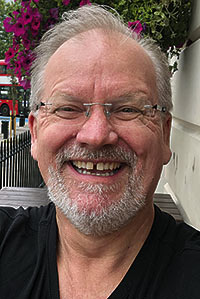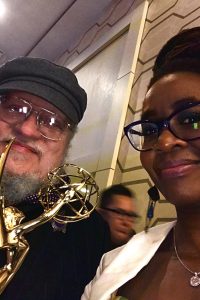Kameron Hurley: Into the Raging ’20s, We Ride
 I’ve found that the insidious problem for me in scrolling through social media is that it feels like action. Ironically, it also creates – in me – a profound feeling of being out of control over events in the wider world, while generating a huge amount of anxiety and worry. But while surfacing atrocity after atrocity, treason after treason, may feel like action, we often find that our righteous need for easy action turns us into agents in the proliferation of disinformation and chaos.
I’ve found that the insidious problem for me in scrolling through social media is that it feels like action. Ironically, it also creates – in me – a profound feeling of being out of control over events in the wider world, while generating a huge amount of anxiety and worry. But while surfacing atrocity after atrocity, treason after treason, may feel like action, we often find that our righteous need for easy action turns us into agents in the proliferation of disinformation and chaos.
“That’s done,” we’ll say, sharing a post about assassination, tax fraud, or the murder of children through neglect. Very rarely do we vet these sources of information. Rarer still do we search for information about what the hell we need to do about it, except worry. Worry and anxiety also – deceptively – feel like action.
My life online and off often sees me surfing through waves of misinformation. Misinformation is about distraction, about dividing and causing chaos. Those who are exhausted and overwhelmed cannot organize around a common cause or common truth. Those who are exhausted and overwhelmed also find that they lack the energy to create, to thrive, to support, to care, to lift up, to protest.
It’s so very easy to forget the power we all have, when forces far greater than us as individuals begin to move weapons across the board while depriving citizens of their freedoms of speech and movement and access to social services. Infrastructure crumbles around us. The old world dies. The new world is being born.
Like many, I’ve spent enough time drunk, anxious, and despondent. Those aren’t actions. Those are the human body shutting down. Understandably so. But not conducive to survival when one lives paycheck to paycheck.
As we barrel toward the spring, I’ve resolved to spend the 2020s engaged in active work; not only the directly political kind, but also the quieter kind, the kind that is the work of crafting meaningful stories that move people. This is my profession. My vocation. Yet I’ve found so much of the headspace I need for creation stolen by a world in upheaval.
I’ve found myself seeking ways to transform how I work in the 2020s. Certainly much of this is about turning away from social sites that are especially bad at policing misinformation. It’s about checking into reputable news sites once or twice a week instead of following the latest tragedy in real time on Twitter. I no longer wake up and scroll through Twitter first thing in the morning. It’s no longer my primary source of news. I go to Twitter for discussions about books and films. My Instagram is primarily full of books and dogs. I deleted Facebook. I’ve started turning off my phone altogether an hour before I want to go to bed.
Our always-on culture has been driven by organizations that seek to get an increasing share of a finite resource: our attention. The more attention I give their services and algorithms, the less attention I have for the things that matter to me: my work, my family, my own social causes.
I’ve watched as the wider social web has begun to splinter into smaller, private groups using services like WhatsApp, Slack, and Discord. It delivers us the social connection we crave without the unfiltered firehouse of bots and promoted misinformation rife on other platforms. It’s interesting that we are moving back to the earlier days of the web, when we had more control over our spaces and forums. If the services won’t curate content, we will.
As someone working from home, alone, doing tasks which are profoundly introverted, I do find that I need a hit of sociability. But not the wave of anxiety that comes with unfettered access to billions of bots and millions of human beings. We are not made for such interactions.
I’ve resolved to spend more time engaging with long form content. Otherwise known as… books. The last year, I have been visiting my local library at least once a week, requesting books via my library app instead of buying them from Amazon. I find that I read them much more quickly, knowing they have a due date, and it’s a relief knowing that I’m not simply adding to the massive pile of unread books I have upstairs.
Concentrating on long form work has also helped me retrain my focus. In a distracting, raging world where most of us are carrying powerful computers in our pockets, it’s easy to find oneself jumping from one social feed to another, one game to another, never allowing ourselves the luxury of deep focus. As a writer, deep focus is vital to the work that I do. Realizing that I could retrain myself to focus again was a revelation.
Most importantly, I have resolved to enjoy more of the things I love. In my last column I talked about the power of giving a damn about something, anything, and how it’s caring that makes us stronger, better, more resilient, and yes – braver. To that end, I am embracing all of the things I love wholeheartedly, whether that means rereading a beloved book until the pages fall out or single-handedly increasing the popularity of The Witcher on Netflix through enthusiastic online evangelism.
I’ve found it easy to forget about joy, the last few years. Here in the raging ’20s, I want it back. I endeavor to make my work fun again, to concentrate on the process of creation that I love so much about this profession. That also means lifting up other writers, blurbing books, shouting about those I adore without hesitation.
I have not always been in this place. I spent a great deal of time ten years ago being angry at everyone and everything, and just raging, raging, raging against it all. I’m still angry, but I’ve found that joy and humor are far easier to sustain than anger. Lifting up will keep me in the game far longer than constantly surfacing the worst of the world and being angry at it. Anger is good when you are ready to conduct an action. But like worry, or anxiety, it’s not a state that I can exist in very long without profoundly negative consequences to health. I am living a lot of those consequences right now, and if I want to thrive here in the next decade, I need to find a better balance.
We are all of us in the process of creation and destruction. Of reimagining. Until we die (and we will all die), we have a chance to build and to break, to lift up or suppress. It’s up to us to choose what we share and celebrate and what we deplatform and discourage.
Whether we like it or not, we are all active agents in this era of misinformation; each of us have a potential megaphone with which to broadcast the very best and very worst of the world. All of us have the power to incite and take action. We can also participate in the rising tide of nihilism, and bring others down with us into despondency and despair. It’s very much our choice. It’s how we decide to spend our attention in this new decade.
Our attention, like our lives, is finite. Choose wisely.
Kameron Hurley is the author of The Stars are Legion and the award-winning essay collection The Geek Feminist Revolution, as well as the God’s War Trilogy and The Worldbreaker Saga. Hurley has won the Hugo Award, Kitschy Award, Locus Award, BFA Award, and Sydney J. Bounds Award for Best Newcomer. She was also a finalist for the Arthur C. Clarke Award, the Nebula Award, and the Gemmell Morningstar Award. Her short fiction has appeared in Popular Science Magazine, Lightspeed Magazine, and many anthologies. Hurley has also written for The Atlantic, Bitch Magazine, The Village Voice, and Entertainment Weekly. She posts regularly at KameronHurley.com.
All opinions expressed by commentators are solely their own and do not reflect the opinions of Locus.
This article and more like it in the February 2020 issue of Locus.
 While you are here, please take a moment to support Locus with a one-time or recurring donation. We rely on reader donations to keep the magazine and site going, and would like to keep the site paywall free, but WE NEED YOUR FINANCIAL SUPPORT to continue quality coverage of the science fiction and fantasy field.
While you are here, please take a moment to support Locus with a one-time or recurring donation. We rely on reader donations to keep the magazine and site going, and would like to keep the site paywall free, but WE NEED YOUR FINANCIAL SUPPORT to continue quality coverage of the science fiction and fantasy field.








“single-handedly increasing the popularity of The Witcher on Netflix through enthusiastic online evangelism.”
Absolutely identify with this. I was fighting back a wave of negativity on Tor.com, largely started after an unfair review by a Tor staffer who only watched 4 episodes and read just one of the books.